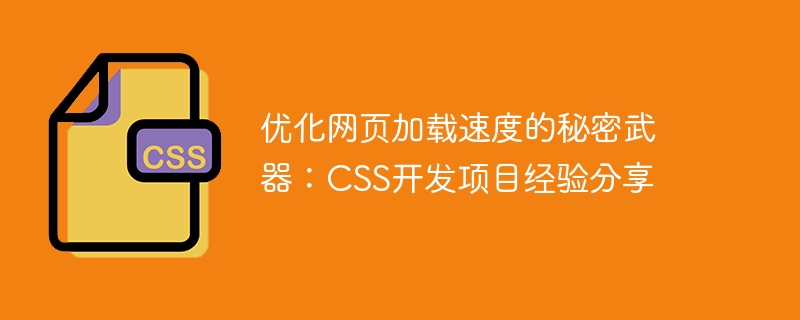Home >Web Front-end >CSS Tutorial >The secret weapon for optimizing web page loading speed: Sharing experience in CSS development projects
The secret weapon for optimizing web page loading speed: Sharing experience in CSS development projects
- WBOYWBOYWBOYWBOYWBOYWBOYWBOYWBOYWBOYWBOYWBOYWBOYWBOriginal
- 2023-11-02 10:51:11866browse

In today’s Internet era, web page loading speed has become one of the important indicators of user experience. Once a web page loads too slowly, users tend to leave immediately, causing user churn and lost business opportunities. Therefore, optimizing web page loading speed has become the goal pursued by every developer.
In the process of web development, CSS (Cascading Style Sheets) plays an important role. CSS is not only used to design and beautify web pages, but also has an impact on web page loading speed. Through reasonable and optimized CSS development, the loading speed of web pages can be greatly improved. This article will share some CSS development project experiences to help developers master the secret weapon for optimizing web page loading speed.
First of all, the compression of CSS files is the basis for optimizing the loading speed of web pages. Before publishing a web page, developers should use various tools to compress CSS files. Compressing CSS files can remove unnecessary spaces, comments, line breaks and other characters, thereby reducing file size. The reduction in file size will significantly increase web page loading speed and reduce user waiting time.
Secondly, avoid using too many external CSS references. When too many external CSS files are referenced in a web page, the browser needs to make requests and download these files one by one, resulting in slower loading. Therefore, merging CSS files reasonably and merging multiple CSS files into one can greatly reduce the number of requests and thus improve loading speed.
In addition, the use of streamlined CSS selectors is also the key to optimizing web page loading speed. Selectors are tags used in CSS to select HTML elements. Different selectors may have the same effect, but they have different effects on loading speed. Generally speaking, using ID selectors is faster than using class selectors or element selectors. Therefore, when writing CSS, try to minimize the use of universal selectors and class selectors and use ID selectors as much as possible.
Secondly, reduce unnecessary repeated attributes in CSS. When multiple CSS styles share the same properties, extracting these properties into a single style can avoid duplication and significantly reduce CSS file size. In addition, you can also use CSS preprocessors (such as Less, Sass) to reduce the use of redundant code and repeated attributes, improve development efficiency and web page loading speed.
Another secret weapon to optimize web page loading speed is to use nested rules. Nested rules allow developers to define styles in CSS files more quickly and flexibly. By placing related element styles under the same selector, you can reduce duplicate code and improve code readability and maintainability. At the same time, nested rules can also reduce the number of selector levels and further improve loading speed.
Finally, using CSS Sprite technology can significantly improve web page loading speed. CSS Sprite refers to merging multiple small pictures into one large picture and displaying the required small picture through the background-position property of CSS. Using CSS Sprite can reduce the number of HTTP requests and reduce the size of image files, thus greatly improving the loading speed of web pages.
In the process of optimizing web page loading speed, CSS development plays a vital role. By compressing CSS files, merging CSS files, streamlining selectors, reducing redundant attributes, and using nested rules and CSS Sprite technology, the loading speed of web pages can be greatly improved and the user experience improved.
However, it should be noted that optimizing web page loading speed cannot be at the expense of the functionality and beauty of the web page. Developers should flexibly use the above technologies to optimize while maintaining the functionality and beauty of web pages.
To sum up, through reasonable and optimized CSS development, it can become the secret weapon to optimize the loading speed of web pages. Mastering these skills and experience can not only improve the loading speed of web pages, but also improve user experience and retain users. Let us continue to explore and practice methods of optimizing loading speed in future web development to create a better user experience.
The above is the detailed content of The secret weapon for optimizing web page loading speed: Sharing experience in CSS development projects. For more information, please follow other related articles on the PHP Chinese website!

